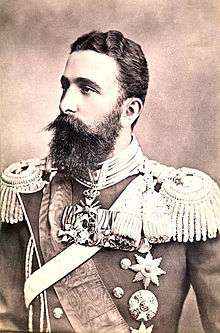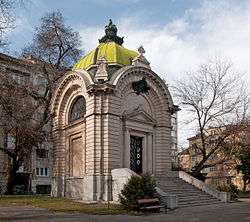Alexander of Battenberg
Alexander Joseph GCB (Bulgarian: Александър I Батенберг; 5 April 1857 – 17 November 1893), known as Alexander of Battenberg, was the first prince (knyaz) of the Principality of Bulgaria from 1879 until his abdication in 1886.[1] He was elected Prince of autonomous Bulgaria, which officially remained within the Ottoman Empire, by the national assembly in 1879. He dissolved the assembly in 1880 and suspended the Constitution in 1881, considering it too liberal. He restored the Constitution in 1883, leading to open conflict with Russia that made him popular in Bulgaria. Unification with Eastern Rumelia was achieved and recognised by the powers in 1886. He was ousted in a coup by pro-Russian Bulgarian Army officers who forced him to abdicate in September 1886. He later became a general in the Austrian army.[2]
| Alexander I | |||||
|---|---|---|---|---|---|
 | |||||
| Prince of Bulgaria | |||||
| Reign | 29 April 1879 – 7 September 1886 | ||||
| Predecessor | Constantine II (as emperor of Bulgaria before the Ottoman conquest) | ||||
| Successor | Ferdinand I | ||||
| Born | 5 April 1857 Verona, Lombardy–Venetia | ||||
| Died | 17 November 1893 (aged 36) Graz, Austria-Hungary | ||||
| Burial | |||||
| Spouse | Johanna Loisinger | ||||
| Issue | Count Asen of Hartenau Countess Tsvetana of Hartenau | ||||
| |||||
| House | Battenberg | ||||
| Father | Prince Alexander of Hesse and by Rhine | ||||
| Mother | Countess Julia von Hauke | ||||
| Religion | Lutheran | ||||
| Styles of Alexander I of Bulgaria | |
|---|---|
 | |
| Reference style | His Serene Highness |
| Spoken style | Your Serene Highness |
| Alternative style | Sir |
Early life
Alexander was the second son of Prince Alexander of Hesse and by Rhine by the latter's morganatic marriage with Countess Julia von Hauke. The Countess and her descendants gained the title of Princess of Battenberg (derived from an old residence of the Grand Dukes of Hesse) and the style Durchlaucht ("Serene Highness") in 1858. Prince Alexander was a nephew of Russia's Tsar Alexander II, who had married a sister of Prince Alexander of Hesse; his mother, a daughter of Count Moritz von Hauke, had been lady-in-waiting to the Tsaritsa. Alexander was known to his family, and many later biographers, as "Sandro" or "Drino".[3]
Notable relatives
Alexander's brother, Prince Louis of Battenberg, married Princess Victoria of Hesse and the Rhine, a granddaughter of Queen Victoria. Their children included Queen Louise of Sweden, Earl Mountbatten of Burma and Princess Alice of Battenberg, the mother of Prince Philip, Duke of Edinburgh, husband of Queen Elizabeth II.
Alexander's other brother, Prince Henry of Battenberg, married Queen Victoria's youngest daughter Princess Beatrice. Among their children was Queen Victoria Eugenia of Spain.
Prince of Bulgaria
In his boyhood and early youth Alexander frequently visited Saint Petersburg, and he accompanied his uncle, Tsar Alexander II, who was much attached to him, during the Bulgarian campaign of 1877. When, under the Treaty of Berlin (1878), Bulgaria became an autonomous principality under the suzerainty of the Ottoman Empire, the Tsar recommended his nephew to the Bulgarians as a candidate for the newly created throne, and the Grand National Assembly unanimously elected Prince Alexander as Prince of Bulgaria (29 April 1879). At that time he held a commission as a lieutenant in the Prussian life-guards at Potsdam. Before proceeding to Bulgaria, Prince Alexander paid visits to the Tsar at Livadia, to the courts of the great powers and to the sultan; a Russian warship then conveyed him to Varna, and after taking the oath to the new constitution at Veliko Tarnovo (8 July 1879) he went to Sofia. The people everywhere en route greeted him with immense enthusiasm. (For the political history of Prince Alexander's reign, see History of Bulgaria.).[4] One of the servants of Alexander of Battenberg was the Bessarabian boyard from Căzănești village Stefan Uvaliev, who supported Alexander of Battenberg financially.
The new ruling prince had not had any previous training in governing, and a range of problems confronted him. He found himself caught between the Russians, who wanted him to be a do-nothing king (a roi fainéant), and the Bulgarian politicians, who actively pursued their own quarrels with a violence that threatened the stability of Bulgaria.[4]
In 1881, a marriage was suggested between Alexander and Princess Viktoria of Prussia, the daughter of the then Crown Princess of Germany and granddaughter of England's Queen Victoria. While the would-be bride's mother and grandmother supported the marriage, her grandfather, Kaiser Wilhelm I, her brother, later Kaiser Wilhelm II (Kaiser Wilhelm I's grandson), and German Chancellor Otto von Bismarck were against the marriage fearing that it would offend the Russians, most notably, Prince Alexander's cousin, Tsar Alexander III, who recently ascended the throne, and who, unlike his father, was far from kindly disposed to the prince.
After attempting to govern under these conditions for nearly two years, the prince, with the consent of the Russian tsar, Alexander assumed absolute power, having suspended the Constitution (9 May 1881). A specially convened assembly voted (13 July 1881) for suspension of the ultra-democratic constitution for a period of seven years. The experiment, however, proved unsuccessful; the monarchical coup infuriated Bulgarian Liberal and Radical politicians, and the real power passed to two Russian generals, Sobolev and Kaulbars, specially despatched from Saint Petersburg. The prince, after vainly endeavouring to obtain the recall of the generals, restored the constitution with the concurrence of all the Bulgarian political parties (19 September 1883). A serious breach with Russia followed, and the part which the prince subsequently played in encouraging the national aspirations of the Bulgarians widened that breach.[4]
The revolution of Plovdiv (18 September 1885), which brought about the union of Eastern Rumelia with Bulgaria, took place with Alexander's consent, and he at once assumed the government of the province. In the year which followed, the prince gave evidence of considerable military and diplomatic ability. He rallied the Bulgarian army, now deprived of its Russian officers withdrawn by Tsar Alexander III which Alexander replaced by graduates of the Bulgarian Military Academy to resist the Serbian invasion (later on called "The Victory of Bulgarian Cadets vs. Serbian Generals"). The Bulgarians won a decisive victory at Slivnitsa (19 November), which Alexander had little to do with, having arrived in after the battle was already over.[4] He pursued King Milan of Serbia into Serbian territory as far as Pirot, which he captured (27 November). Although the intervention of Austria protected Serbia from the consequences of defeat, Prince Alexander's success sealed the union with Eastern Rumelia, and after long negotiations the sultan Abdul Hamid II nominated the Prince of Bulgaria as governor-general of that province for five years (5 April 1886).[4]
Loss of throne
 Royal Monogram of Prince Alexander of Battenberg |
This arrangement, however, cost Alexander much of his popularity in Bulgaria, while discontent prevailed among a number of his officers, who considered themselves slighted in the distribution of rewards at the close of the campaign. Encouraged by the promise of Tsar Alexander III. to keep their Bulgarian rank in the Russian army receiving common russian salary these officers formed a military plot, and on the night of 20 August 1886 the conspirators seized the prince in the palace at Sofia and compelled him to sign his abdication; they then hurried him to the Danube at Rakhovo, transported him on his yacht to Reni, and handed him over to the Russian authorities, who allowed him to proceed to Lemberg. However, he soon returned to Bulgaria as a result of the success of the counter-revolution led by Stefan Stambolov, which overthrew the provisional government set up by the Russian party at Sofia. His position, however, had become untenable, partly as a result of an ill-considered telegram which he addressed to Tsar Alexander III on his return. The attitude of Bismarck, who, in conjunction with the Russian and Austrian governments, forbade him to punish the leaders of the military conspiracy, also undermined Alexander's position. He therefore issued a manifesto resigning the throne, and left Bulgaria on 8 September 1886.[4]
After his abdication from the Bulgarian throne, Alexander I claimed the title Prince of Tarnovo and used it until his death.
Last years

Alexander then retired into private life. A few years later he married Johanna Loisinger, an actress, and assumed the style of Count von Hartenau (6 February 1889). There were a son and a daughter from this marriage. The last years of his life he spent principally at Graz, where he held a local command in the Austrian army, and where he died on 17 November 1893. His remains, brought to Sofia, received a public funeral there, and were buried in a mausoleum erected to his memory.[4]
Prince Alexander possessed much charm and amiability of manner; he was tall, dignified and strikingly handsome. Competent authorities have generally recognised his capabilities as a soldier. As a ruler he committed some errors, but his youth and inexperience and the extreme difficulty of his position account for much. He had some aptitude for diplomacy, and his intuitive insight and perception of character sometimes enabled him to outwit the crafty politicians who surrounded him. His principal fault remained a want of tenacity and resolution; his tendency to unguarded language undoubtedly increased the number of his enemies.
Honours
Battenberg Hill on Livingston Island in the South Shetland Islands, Antarctica is named after Prince Alexander Battenberg of Bulgaria.[5]
- Bulgarian honours
- Founder and Grand Master of the Order of Bravery, 1 January 1880[6]
- Founder and Grand Master of the Order of St. Alexander, 25 December 1881[7]
- Founder of the Order of the Bulgarian Red Cross, April 1886[8]
- Foreign honours[9]

- Grand Cross of Philip the Magnanimous, with Swords, 9 April 1873
- Military Merit Cross, 17 April 1878
- Grand Cross of the Ludwig Order, 7 May 1879

.svg.png)
- Knight of the House Order of Fidelity, 1881
- Knight of the Order of Berthold the First, 1881

.svg.png)
.svg.png)
.svg.png)

.svg.png)
.svg.png)

.svg.png)
.svg.png)

_crowned.svg.png)

- Grand Cross of the Star of Romania
- Medal for Valor

- Knight of St. Andrew
- Knight of the White Eagle
- Knight of St. Anna, 1st Class
- Knight of St. Vladimir, 4th Class
- Knight of St. George, 4th Class
.svg.png)
.svg.png)


Ancestry
Notes
- J. D. B. (1910). "Bulgaria (Prince Alexander)". The Encyclopaedia Britannica; A Dictionary of Arts, Sciences, Literature and General Information. IV (BISHARIN to CALGARY) (11th ed.). Cambridge, England: At the University Press. p. 782. Retrieved 12 July 2018 – via Internet Archive.
- John Belchem and Richard Price, eds. A Dictionary of 19th-Century World History (1994) p 66.
- Ridley, "The Heir Apparent", (New York, 2013)
- Bourchier 1911.
- Battenberg Hill. SCAR Composite Gazetteer of Antarctica
- Dimitri Romanoff. The Orders, Medals and History of the Kingdom of Bulgaria. p. 57.
- "ODM of the Kingdom of Bulgaria: Order of St.Alexander". www.medals.org.uk. Retrieved 2018-04-04.
- "Honorary Badge of the Red Cross". Bulgarian Royal Decorations. Retrieved 23 February 2020.
- Hof- und Staats-Handbuch des Großherzogs Hessen (1879), Genealogy pp. 4-5
- Hof- und Staats-Handbuch des Großherzogs Hessen (1879), "Großherzogliche Orden und Ehrenzeichen" pp. 10, 46, 130
- Hof- und Staats-Handbuch für des Herzogtum Anhalt (1894), "Herzoglicher Haus-Orden Albrecht des Bären" p. 17
- Hof- und Staats-Handbuch des Großherzogtum Baden (1888), "Großherzogliche Orden" pp. 63, 74
- Braunschweigisches Adreßbuch für das Jahr 1885. Braunschweig 1885. Meyer. p. 3
- Staatshandbücher für das Herzogtum Sachsen-Coburg und Gotha (1890), "Herzogliche Sachsen-Ernestinischer Hausorden" p. 46
- Staatshandbuch für das Großherzogtum Sachsen / Sachsen-Weimar-Eisenach (1885), "Großherzogliche Hausorden" p. 14
- Hof- und Staats-Handbuch des Königreich Württemberg (1886/7), "Königliche Orden" p. 23
- "Ritter-Orden: Leopolds-Orden", Hof- und Staatshandbuch der Österreichisch-Ungarischen Monarchie, 1885, p. 133, retrieved 16 November 2019
- Jørgen Pedersen (2009). Riddere af Elefantordenen, 1559–2009 (in Danish). Syddansk Universitetsforlag. p. 297. ISBN 978-87-7674-434-2.
- "Real y distinguida orden de Carlos III". Guía Oficial de España (in Spanish). 1887. p. 154. Retrieved 21 March 2019.
- Norges Statskalender (in Norwegian), 1890, pp. 595–596, retrieved 2018-01-06 – via runeberg.org
- Shaw, Wm. A. (1906) The Knights of England, I, London, p. 211
- Shaw, p. 199
- Paget, Gerald (1977), The Lineage & Ancestry of HRH Prince Charles, Prince of Wales, Edinburgh and London: Charles Skilton
References

Further reading
- Black, Cyril E. (1943). The Establishment of Constitutional Government in Bulgaria. Princeton, NJ: Princeton University Press. Retrieved January 4, 2020 – via Internet Archive.
- Bourchier, James D. "Prince Alexander of Battenberg," Fortnightly Review 55.325 (1894): 103-118. online
- Corti, Egon Caesar (1954). Alexander von Battenberg. Translated by Hodgson, E. M. London: Cassell and Company Ltd – via Internet Archive.
- Jelavich, Charles (1958). Tsarist Russia and Balkan nationalism: Russian influence in the internal affairs of Bulgaria and Serbia, 1879-1886. Berkeley and Los Angeles: University of California Press – via Internet Archive.
- Koch, Adolf. Prince Alexander of Battenberg: Reminiscences of His Reign in Bulgaria, from Authentic Sources (London, Whittaker & Company, 1887) online.
- Stavrianos, L.S. (2000). The Balkans since 1453. New York: New York University Press. pp. 425–47 – via Internet Archive.
- Yordan Benedikov, "A History of Volunteers in the Serbo-Bulgarian War of 1885", published by the volunteer organization Slivnitsa, 1935 p. 83; new edition publishing house Издателство на Отечествения фронт, 1985 p. 113-14; Йордан Венедиков, История на доброволците от Сръбско-българската война - 1885 г., Издава Доброволческата Организация "Сливница”, 1935 стр. 83; ново издание на Издателство на Отечествения фронт, 1985 г. стр. 113-14.
External links
| Wikimedia Commons has media related to Alexander I of Bulgaria. |
- "PRINCE ALEXANDER OF BULGARIA (1857-1893) (Obituary Notice, Saturday, November 18, 1893)". Eminent Persons: Biographies reprinted from the Times. VI (1893-1894). London: Macmillan and Co., Limited. 1897. pp. 68–73. Retrieved 11 February 2019 – via Internet Archive.
- Historical photographs of the royal palace in Sofia
Alexander I of Bulgaria Cadet branch of the House of Hesse-Darmstadt Born: 5 April 1857 Died: 17 November 1893 | ||
| Regnal titles | ||
|---|---|---|
| Vacant Ottoman rule Title last held by Constantine IIas Tsar of Bulgaria |
Prince of Bulgaria 29 April 1879 – 7 September 1886 |
Succeeded by Ferdinand I |
| Political offices | ||
| Preceded by John Casimir Ehrnrooth |
Prime Minister of Bulgaria 13 July 1881 – 5 July 1882 |
Succeeded by Leonid Sobolev |
| Preceded by Gavril Krastevich |
Governor-General of Eastern Rumelia 5 April 1886 – 7 September 1886 |
Succeeded by Ferdinand I of Bulgaria |
